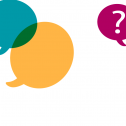Health is a state of complete physical, mental and social well-being, and not merely the absence of disease or infirmity.
World Health Organization, 1948
 When we talk about mental health and mental well-being, we are referring to a person’s ability to realize their own potential, cope with the normal stresses of life, work productively and fruitfully, and contribute to their community.
When we talk about mental health and mental well-being, we are referring to a person’s ability to realize their own potential, cope with the normal stresses of life, work productively and fruitfully, and contribute to their community.
Definitions of mental illness have changed over time. Broadly, mental illness refers to changes in patterns of thinking, feeling or acting that continue over time. It may interfere with daily functioning in social, work, and family contexts. Causes of mental illness may be biological, psychological, social, or any combination of these.
Mental health and physical health are deeply linked. Physical illness or injury can have a negative impact on mental health. Conversely, mental illness can be accompanied by a broad range of chronic physical conditions.
Signs of a possible mental health issue
There are a number of signs and symptoms that you may notice in yourself, a co-worker or a member that can indicate a possible mental health issue. Noticing signs is a key first step in determining your approach to a situation.
Watch out for:
- Changes in eating/sleeping habits
- Withdrawal/isolation
- Alcohol or drug use
- Changes in personal appearance
- Changes in energy/sociability/physical health/behaviour
- Loss of focus/productivity
- Frequent absences
- Errors or accidents on the job
- Talking about strange ideas
If you notice signs of possible mental health issues, avoid making a diagnosis. Only a doctor can do that. Many of the signs and symptoms of one mental illness could also be an indication of another, or of other circumstances that are affecting someone’s mental health. Avoid passing judgement or making assumptions about someone’s behaviour. This can unintentionally cause serious damage.
Categories of common mental illnesses
- Schizophrenia (e.g. psychosis)
- Mood disorders (e.g. depression, bipolar disorder)
- Panic disorders (e.g. phobias, post-traumatic stress disorder)
- Impulse control and addictions
- Personality disorders




